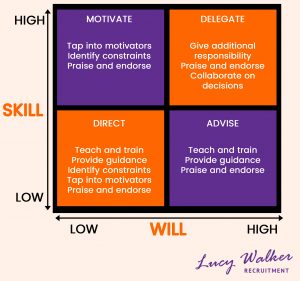Underperformance is an issue most, if not all, managers or leaders will experience within their teams or organisation at some point in their career. Recognising it is the first stage, but effectively dealing with it is something else. Below, we set out the process to follow.
We know this as a fact at Lucy Walker Recruitment because every week we are talking to managers and leaders about their teams and about how we can help their productivity at work with the resources at our disposal.
Underperformance, in all its guises, can happen because of many things including:-
-
not having a goal or vision
- not having the right skills in place with the right people in place
We are not talking about misconduct, sometimes managers can and do confuse the two. When we are talking underperformance think ;
-
a low standard of work,
-
not meeting objectives,
-
poor activity or productivity levels.
So when it comes to underperformance what next? What are the key factors?
1. Isolate the Root Cause

All too often underperformance can create a panicked reaction full of emotions and judgement rather than a thoughtful process where questions are asked and the analysis of the issue is based on behaviour and data.
It's vital to work through the facts!
For instance, if you have entered a brand new vertical market and it hasn't produced the results you had budgeted for, don't automatically blame your sales team.
Ask yourself questions...
-
Is the correct marketing and lead generation system in place for your BDM's to delver their sales objectives?
-
Has the planning department over-egged the full year target for this year based on a regional market performing at higher levels.
-
Conversely, is a team or individuals struggling with productivity and performance because of lack of skill?
Sounds obvious, but you need to strip the emotion out of it to get to the cause.
Let's explore this one a little more...
2. Is it Down To An Individual or a Team?

Here is a crucial factor often missed.....Teams are full of Individuals.
Is it an individual team member that isn't performing which is impacting the entire team? Or is the entire team struggling? All too often managers can create a "fix" based on the whole team rather than supporting an individual to perform at their best.
Having worked with many sales managers who recruit BDM's over the years, it is common to discover that a high performing or business critical territory has an inexperienced BDM in place; no wonder the figures are down. The knock on effect of this is that the entire region can suffer because the West Yorkshire territory is consistently below target.
Worth remembering here, is that it's key to ensure all individuals are properly recruited into the organisation and on boarded by your organisation. Getting this wrong can have a snowball effect. Its worth having a read of our Top 10 Hiring Mistakes and How to Avoid them Report.
3. Set Clear Visions, Goals and Objectives

Though I appreciate this is more 'management 101' theory, all too often this process is not communicated well to the team.
Maybe it is time to ask the uncomfortable question; do you communicate goals and objectives well? Are they kept alive with a consistent review process?
Seth Godin, the well-known business leader, talks about the fact that as human beings, primarily as employees we like to be led. We want to know what the bigger goal is and how we fit in and especially what contribution is required from us.
My experience as a business leader over 30 years is that clear communication is critical if you want to avoid underperformance.
4. Coaching is Critical
As I have highlighted before, underperformance commonly occurs at an individual level. That being the case, the ability to coach and develop individuals in your team is vital.
A well know coaching process, documented below, involves the Skill Will process made famous by Max Landsberg in his bestseller 'The Tao of Coaching'.

In a nutshell, the image shows how it works by helping you decide whether the underperformance is down to lack of skill or lack of will. Once you establish this, you can then coach accordingly.
5. Sometimes a Square Peg needs to be Moved to a Round Hole
Employer Brand and culture are hot topics in managing a multigenerational workforce. In today's changing economy, it may well be that a culture shift has occurred in the organisation and a mismatch has happened. It happens, and therefore needs to be handled.
Mr or Mrs Square Peg no longer fits in the round hole that has appeared for them. They still have great skills however not for the role they are being asked to perform or deliver in a way that the business now needs them to.
It is no ones fault as we live in a world of constant change. Perhaps the individual in question would fit better in a different role or department.
6. Recruit A New Member of The Team
The strategies we have shared are time-tested and worth implementing. Also what many clients we work with do is to bring in new team members to add to the skill mix in the team.
I am sure all of us at one time or another have had the experience of a new team member joining that has helped to elevate the entire team to a new level.
Of course for critical positions the recruiting process needs to be thorough and utilise all the latest technologies and methodologies we now have access too such as our engage platform. You can find out more about this here.
Can We Help?
We have placed and filled over 100,000 temp and permanent assignments over the last 30 years so have a range of techniques, ideas and platforms which could help you. Why not call us on 0113 367 2880 to have a conversation with one of our team. Alternatively drop us an email here.












.png)







